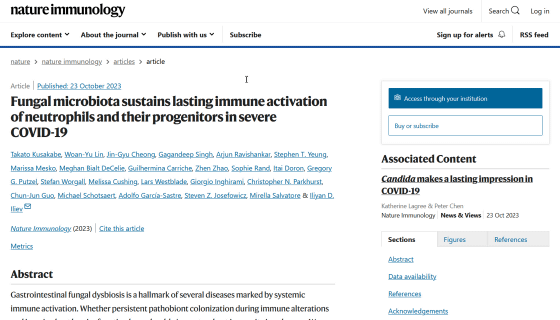Research results show that the ``balance of fungi living in the intestines'' is related to the risk of aggravation of the new coronavirus and long COVID

The human body is inhabited by a huge number of
Fungal microbiota sustains lasting immune activation of neutrophils and their progenitors in severe COVID-19 | Nature Immunology
https://www.nature.com/articles/s41590-023-01637-4

Inflammation in severe COVID linked to excess gut fungi
https://www.nature.com/articles/d41586-023-03295-w
Gut Fungi's Lasting Impact on Severe COVID-19 Immune Response | Newsroom | Weill Cornell Medicine
https://news.weill.cornell.edu/news/2023/10/gut-fungis-lasting-impact-on-severe-covid-19-immune-response
Could gut fungi be linked to severe COVID? What to make of new research findings
https://theconversation.com/could-gut-fungi-be-linked-to-severe-covid-what-to-make-of-new-research-findings-216084
The microbiome interacts with the human body in various ways related to health and disease, such as metabolism and immune function, and in recent years, research has focused particularly on the intestinal flora that lives in the intestines. is. It is known that the intestinal flora also interacts with COVID-19, and at the time of writing, more than 700 papers researching the relationship between COVID-19 and the intestinal flora have been published.
In addition, it has been reported that some COVID-19 patients are complicated by fungal infections such as mucormycosis and aspergillosis , and not only the intestinal flora but also the fungal flora and mycobiota that live in the human body are affected by COVID-19. It has been suggested that it may be related to 19.

Therefore, a research team led by
First, the research team examined blood samples taken from 91 patients hospitalized with COVID-19 in 2020. Three-quarters of patients developed severe COVID-19 and required more than 6 liters of supplemental oxygen per minute or invasive mechanical ventilation, while the rest had moderate or mild symptoms. thing.
The analysis found that patients with severe COVID-19 were more susceptible to three fungal species, including Candida albicans , a member of the Candida genus , compared to subjects who did not test positive for the novel coronavirus (SARS-CoV-2). It turned out that they produced about four times as many antibodies. The fact that more fungal antibodies were being produced means that the amount of these fungi was increasing in the subjects' bodies.
Analysis of fecal samples taken from 10 patients who developed COVID-19 in early 2021 also showed particularly high levels of Candida spp. compared to healthy individuals. In these COVID-19 patients, the amount of Candida fungi was associated with the severity of COVID-19.

Previous
The research team also conducted experiments comparing mice infected with Candida albicans isolated from severely ill COVID-19 patients and SARS-CoV-2, and mice infected only with SARS-CoV-2. The results confirmed that mice infected with Candida albicans had more neutrophils entering the lungs and more activated inflammatory responses than mice infected only with SARS-CoV-2. This effect was reduced when mice were given an antifungal drug.
They also found that levels of Candida albicans antibodies and neutrophil precursors remained elevated in patients with severe COVID-19 for up to a year after recovery. This suggests that fungi may be involved in long COVID, a known aftereffect of COVID-19.

This study has several limitations to consider, including the small number of participants and the use of samples taken from patients early in the COVID-19 pandemic. However, the finding that the fungus and COVID-19 may be related may have an impact on future COVID-19 treatment and diagnosis.
Related Posts:
in Science, Posted by log1h_ik







